Book 6 Module 1 Vocabulary and Reading 课文学案
外研版高二英语选修6_Module1_Introduction_and_Reading精品导学案
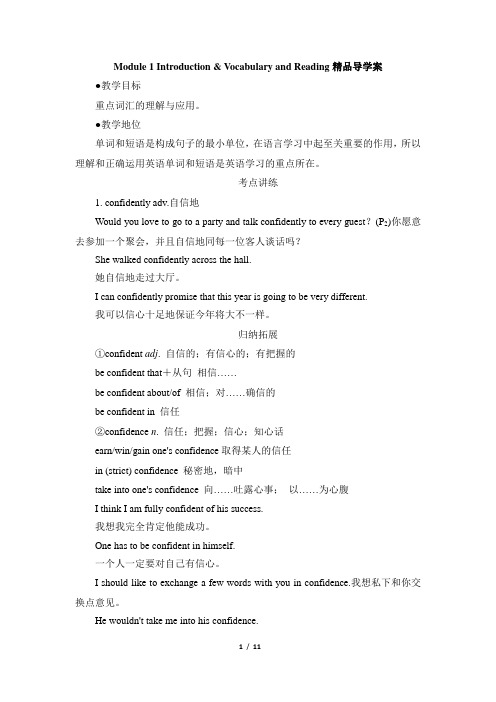
Module 1 Introduction & Vocabulary and Reading精品导学案●教学目标重点词汇的理解与应用。
●教学地位单词和短语是构成句子的最小单位,在语言学习中起至关重要的作用,所以理解和正确运用英语单词和短语是英语学习的重点所在。
考点讲练1. confidently adv.自信地Would you love to go to a party and talk confidently to every guest?(P2)你愿意去参加一个聚会,并且自信地同每一位客人谈话吗?She walked confidently across the hall.她自信地走过大厅。
I can confidently promise that this year is going to be very different.我可以信心十足地保证今年将大不一样。
归纳拓展①confident adj. 自信的;有信心的;有把握的be confident that+从句相信……be confident about/of 相信;对……确信的be confident in 信任②confidence n. 信任;把握;信心;知心话earn/win/gain one's confidence取得某人的信任in (strict) confidence 秘密地,暗中take into one's confidence 向……吐露心事;以……为心腹I think I am fully confident of his success.我想我完全肯定他能成功。
One has to be confident in himself.一个人一定要对自己有信心。
I should like to exchange a few words with you in confidence.我想私下和你交换点意见。
高中英语外研版选修6学案:Module 1-Section Ⅱ 含解析(精修版)
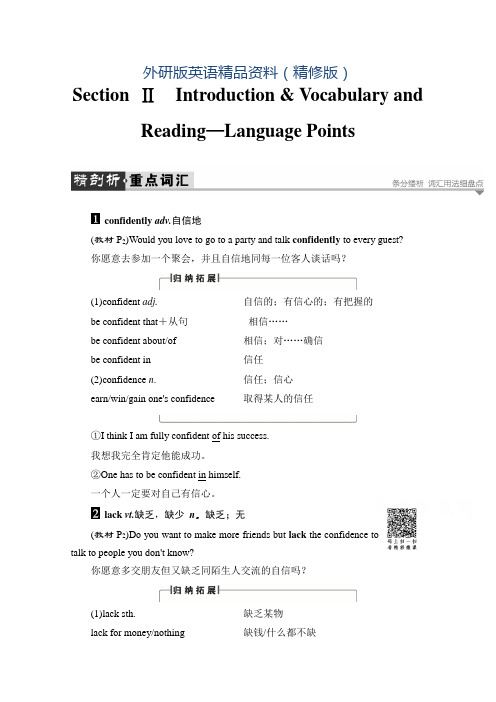
外研版英语精品资料(精修版)Section ⅡIntroduction & Vocabulary and Reading—Language Pointsconfidently adv.自信地(教材P2)Would you love to go to a party and talk confidently to every guest?你愿意去参加一个聚会,并且自信地同每一位客人谈话吗?(1)confident adj.自信的;有信心的;有把握的be confident that+从句相信……be confident about/of 相信;对……确信be confident in 信任(2)confidence n. 信任;信心earn/win/gain one's confidence 取得某人的信任①I think I am fully confident of his success.我想我完全肯定他能成功。
②One has to be confident in himself.一个人一定要对自己有信心。
lack vt.缺乏,缺少n.缺乏;无(教材P2)Do you want to make more friends but lack the confidence totalk to people you don't know?你愿意多交朋友但又缺乏同陌生人交流的自信吗?(1)lack sth. 缺乏某物lack for money/nothing 缺钱/什么都不缺(2)lack n. 缺少,缺乏the/a lack of... ……不足for lack of 因缺乏……(3)lacking adj.缺少的,缺乏的be lacking in 缺乏;没有①Lack of money is the root of all evil.缺乏金钱是万恶之源。
②He is lacking in responsibility.他缺乏责任心。
高中英语选修6外研版课件:Module1+Period+One

Ⅲ.重点句式
1.主语+be+adj.+to do
And they are easy to learn(learn). 这些(技能)学起来很容易。
2.定语从句
think of topics that you would avoid if you were talking to strangers... 想一些当你和陌生人谈话时不会谈论的话题…… Listening is a skill which most people lack... 聆听是多数人缺乏的技巧…… look away from the person who is talking to you lk to a man about himself , and he will speak to you for hours! 和一个人谈论他自己,他就会和你说上几个小时!
课文预读
Ⅰ.课文判断正(T)误(F) 1.It is common to use small talk when you are waiting in a long lineup.( T ) 2.Religion is a safe topic when we make small talk.( F ) 3.It is rude for both children and adults not to make small talk with strangers.( F ) 4.It is impolite to interrupt a conversation in order to make small talk.( T ) 5.Politics is a topic which is controversial in small talk.( T )
As a rule,the conversation distance between two people is at least two or three feet.Standing at a closer range will make many Americans feel uneasy.
外研版八年级英语上册Module 6 Unit 1(含音频)

protect wild grow
enough peace notice raise
v. 保护;保卫 adj. 野生的 n. 野生环境 v.(逐渐)变得;生长 adj. 足够的;充分的 n. 和平;太平 n. 布告;告示 v. 筹集(钱款);抚养;养育
Listening and vocabulary
so few pandas. They made the programme to show people how the animals live.
Tony: Yes, I saw it. Now I understand why pandas are so special. But we want other animals to be safe too. There aren’t many lions, elephants and bears left in the world.
2. Often there isn’t enough clean water.
1. Raise some money at school.
2. Find out what else we can do to save as many animals as possible.
_P__a_n_d_a_s_ are in danger because they don’t have a __sa_f_e_p__la_c_e_ to live because villages and _f_a_r_m_s_ are growing _b_i_g_g_e_r and people are _t_a_k_i_n_g_a_w__a_y_
Lingling: It’s sad to think of pandas and other animals in danger. 处于危险中
Book6Module1Smalltalk
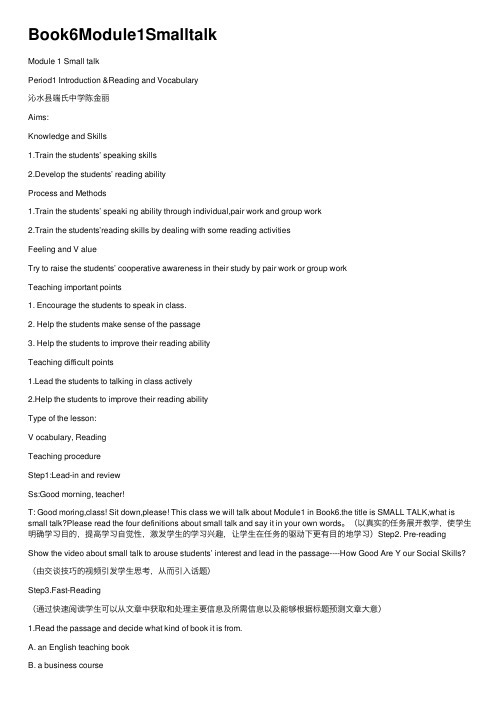
Book6Module1SmalltalkModule 1 Small talkPeriod1 Introduction &Reading and Vocabulary沁⽔县端⽒中学陈⾦丽Aims:Knowledge and Skills1.Train the students’ speaking skills2.Develop the students’ reading abilityProcess and Methods1.Train the students’ speaki ng ability through individual,pair work and group work2.Train the students’reading skills by dealing with some reading activitiesFeeling and V alueTry to raise the students’ cooperative awareness in their study by pair work or group workTeaching important points1. Encourage the students to speak in class.2. Help the students make sense of the passage3. Help the students to improve their reading abilityTeaching difficult points1.Lead the students to talking in class actively2.Help the students to improve their reading abilityType of the lesson:V ocabulary, ReadingTeaching procedureStep1:Lead-in and reviewSs:Good morning, teacher!T: Good moring,class! Sit down,please! This class we will talk about Module1 in Book6.the title is SMALL TALK,what is small talk?Please read the four definitions about small talk and say it in your own words。
必修三Module 1 Europe Reading and Vocabulary导学提纲
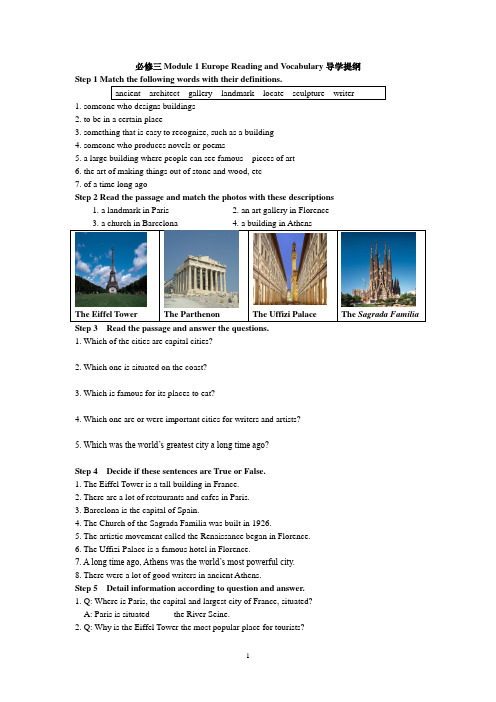
必修三Module 1 Europe Reading and Vocabulary导学提纲1. someone who designs buildings ___________2. to be in a certain place ___________3. something that is easy to recognize, such as a building ___________4. someone who produces novels or poems ___________5. a large building where people can see famous pieces of art ___________6. the art of making things out of stone and wood, etc ___________7. of a time long ago ___________Step 2 Read the passage and match the photos with these descriptions1. a landmark in Paris2. an art gallery in FlorenceThe Eiffel Tower The Parthenon The Uffizi Palace The Sagrada Familia Step 3 Read the passage and answer the questions.1. Which of the cities are capital cities?_____________________________________________________________________________ 2. Which one is situated on the coast?_____________________________________________________________________________ 3. Which is famous for its places to eat?_____________________________________________________________________________ 4. Which one are or were important cities for writers and artists?_____________________________________________________________________________ 5. Which was the world’s greatest city a long time ago?_____________________________________________________________________________ Step 4 Decide if these sentences are True or False.1. The Eiffel Tower is a tall building in France.2. There are a lot of restaurants and cafes in Paris.3. Barcelona is the capital of Spain.4. The Church of the Sagrada Familia was built in 1926.5. The artistic movement called the Renaissance began in Florence.6. The Uffizi Palace is a famous hotel in Florence.7. A long time ago, Athens was the world’s most powerful city.8. There were a lot of good writers in ancient Athens.Step 5 Detail information according to question and answer.1. Q: Where is Paris, the capital and largest city of France, situated?A: Paris is situated_____ the River Seine.2. Q: Why is the Eiffel Tower the most popular place for tourists?A: Because the Eiffel Tower is the famous _____ of Paris.3. Q: Who designed the Church of the Sagrada Familia?A: The Church of the Sagrada Familia was designed by an_____ called Antonio Gaudi.4. Q: Why is the Italian city Florence famous?A: Because the city was famous for the Renaissance, a great ______ movement which lasted for _____ hundred years.5. Q: When was Athens the most powerful city of the world?A: Athens was the world‘s most powerful city about _____ thousand _____ hundred years ago. Step 6 Choose the best answer according to the passage.1. Which of the following is NOT the element to make Paris famous?A. The Eiffel Tower.B. The Louvre.C. Its restaurants, cafés and theatres.D. The artists and writers living in Paris.2. Which of the following statements is TRUE about Barcelona?A. It is the largest city of Spain.B. It is the capital city of Spain.C. The Church of the Sagrada Familia is one of the most famous sites in the city.D. The Church of the Sagrada Familia took the architect over 44 years to finish.3. Florence is famous for many things EXCEPT ________.A. the RenaissanceB. the landscape of the cityC. many great artists and their worksD. some art galleries, churches and museums4. In which way mentioned in the passage was Athens different from the other three cities?A. It is the capital city and the birthplace of the civilisation.B. It was the world's most powerful city with a long history.C. There are many famous buildings in Athens.D. Many writers living in Athens have influenced other writers with their works.5. How many of the four cities are capital cities?A. One.B. Two.C. Three.D. Four.Step 7 Which European city do you want to travel most? And why?Step 8 Fill in the blanks according to the passage.Paris is the capital and largest city of France, 1 on the River Seine. The Eiffel Tower is the famous 2 of Paris. The Louvre is also 3 in Paris, which is famous 4 its restaurants, cafés and theatres.Barcelona is the second 5 city of Spain and is situated 6 the northeast coast. The Church of the Sagrada Familia is one of Barcelona's most famous 7 .Florence is an 8 city which became famous because of the Renaissance. Each year, about a million tourists come to see the art galleries, churches and museums in Florence.Athens, the 9 of Greece, is known 10 the birthplace of western civilisation.。
外研版高中英语选修6-11课本目录(义务教育教科书)

高二英语选修6电子课本目录MODULE 1 Small TalkINTRODUCTIONVOCABULARY AND READINGFUNCTIONREADING AND LISTENINGGRAMMARREADING AND WRITINGREADING AND VOCABULARYEVERYDAY ENGLISHREADING PRACTICECULTURAL CORNERTASKModul e FileMODULE 2 Fantasy LiteratureINTRODUCTIONREADING AND VOCABULARYGRAMMARSPEAKINGLISTENING AND VOCABULARYGRAMMARFUNCTIONSPEAKINGVOCABULARY AND READINGEVERYDAY ENGLISHWRITINGREADING PRACTIONCULTURAL CORNERTASKMODULE 3 Interpersonal Relationships——Friendship INTRODUCTIONREADING AND VOCABULARYGRAMMAR(1)SPEAKINGLISTENING AND VOCABULARYGRAMMAR(2)FUNCTION AND SPEAKINGVOCABULARY AND READINGEVERYDAY ENGLISHWRITINGREADING PRACTIONCULTURAL CORNERTASKModul e FileMODULE 4 MusicINTRODUCTIONREADING AND VOCABULARYGRAMMARVOCABULARY AND LISTENINGVOCABULARY AND READINGFUNCTIONSPEAKINGWRITINGEVERYDAY ENGLISHREADING PARCTICECULTURAL CORNERTASKMODULE 5 Cl oningINTRODUCTIONREADING AND VOCABULARYFUNCTIONSPEAKINGLISTENING AND VOCABULARYGRAMMAREVERYDAY ENGLISHVOCABULARY AND READINGWRITINGREADING PARCTICECULTURAL CORNERTASKModul e FileMODULE 6 War and PeaceINTODUCTIONVOCABULARY AND READINGGRAMMARLISTENI NGFUNCTIONREADING AND WRITINGSPEAKINGREADING AND VOCABULARYEVERYDAY ENGLISHREADING PRACTICECULTURAL CORNERTASKModul e FileMODULE 7 RevisionGRAMMAR AND FUNCTIONVOCABULARYSPEAKINGREADINGLISTENING AND WRITINGWRITINGMODULE 1 Small TalkMODULE 2 Fantasy LiteratureMODULE 3 Interpersonal Relationships——Friendship MODULE 4 MusicMODULE 5 Cl oningMODULE 6 War and PeaceAppendicesNotes to the TaxtsGrammarWords and ExpressionsNames and PlacesVocabulary高二英语选修7电子课本目录Modul e1 BasketballINTRODUCTIONREADING AND VOCABULARYSPEAKINGGRAMMAR 1LISTENING AND VOCABULARYFUNCTIONREADING AND WRITINGGRAMMAR 2READING PRACTICECULTURAL CORNERTASKMODULE FILEModul e2 Highlights of My Senior Year INTRODUCTIONREADING AND VOCABULARY 1GRAMMAR 1SPEAKINGREADING AND VOCABULARY 2LISTENING AND VOCABULARYGRAMMAR 2FUNCTIONREADING AND VOCABULARY 3SPEAKINGEVERYDAY ENGLISHWRITINGREADING PRACTICECULTURAL CORNERTASKMODULE FILEModul e3 LiteratureINTRODUCTIONREADING AND VOCABULARY 1GRAMMAR 1SPEAKING 1VOCABULARY AND LISTENINGGRAMMAR 2 AND FUNCTIONSPEAKING 2EVERYDAY ENGLISHREADING AND VOCABULARY 2WRITINGREADING PRACTICECULTURAL CORNERTASKMODULE FILEModul e4 Music Born in America INTRODUCTIONREADING AND VOCABULARYGRAMMAR 1LISTENINGGRAMMAR 2FUNCTIONEVERYDAY ENGLISHREADING AND WRITINGSPEAKINGREADING PRACTICECULTURAL CORNERTASKMODULE FILEModul e5 Ethnic CultureINTRODUCTIONREADING AND VOCABULARY 1GRAMMAR 1SPEAKINGLISTENING AND VOCABULARYGRAMMAR 2EVERYDAY ENGLISHSPEAKING AND FUNCTIONREADING AND VOCABULARY 2WRITINGREADING PRACTICECULTURAL CORNERTASKMODULE FILEModul e6 The Worl d"s Cultural Heritage INTRODUCTIONVOCABULARY AND READINGGRAMMAR 1LISTENING AND VOCABULARYGRAMMAR 2 AND FUNCTIONREADING AND WRITINGSPEAKINGREADING PRACTICECULTURAL CORNERTASKMODULE FILEModul e7 RevisionGRAMMAR AND FUNCTIONSVOCABULARYVOCABULARY AND READINGLISTENINGSPEAKINGWRITINGWORKBOOKModul e1 BasketballModul e2 Highlights of My Senior YearModul e3 LiteratureModul e4 Music Born in AmericaModul e5 Ethnic CultureModul e6 The Worl d"s Cultural Heritage Appendices 附录Notes to the TextsGrammarWords and ExpressionsNames and PlacesVocabulary封底高二英语选修8电子课本目录Modul e1 Deep SouthINTRODUCTIONREADING AND VOCABULARY 1SPEAKING AND WRITINGGRAMMAR 1READING AND VOCABULARY 2LISTENING AND SPEAKINGEVERYDAY ENGLISHGRAMMAR 2WRITING AND SPEAKINGREADING PRACTICECULTURAL CORNERTASKModul e FileModul e2 The RenaissanceINTRODUCTIONREADING AND VOCABULARY 1GRAMMARLISTENING AND SPEAKINGGRAMMARREADING AND WRITING 2VOCABULARYREADING PRACTICECULTURAL CORNERTASKModul e FileModul e3 Foreign FoodINTRODUCTIONREADING AND VOCABULARY 1GRAMMAR 1VOCABULARY AND LISTENINGSPEAKINGEVERYDAY ENGLISHREADING 2GRAMMAR 2WRITINGREADING PRACTICECULTURAL CORNERTASKModul e FileModul e4 Which English?INTRODUCTIONREADING AND VOCABULARY 1GRAMMAR 1LISTENINGEVERYDAY ENGLISHGRAMMAR 2SPEAKINGREADING AND VOCABULARY 2WRITINGREADING PRACTICECULTURAL CORNERTASKModul e FileModul e5 The Conquest of the Universe INTRODUCTIONREADING AND VOCABULARY 1GRAMMARLISTENING AND SPEAKINGEVERYDAY ENGLISHGRAMMARSPEAKINGREADING AND VOCABULARY 2WRITINGREADING PRACTICECULTURAL CORNERTASKModul e FileModul e6 The Tang PoemsINTRODUCTIONREADING AND VOCABULARY 1GRAMMARLISTENING AND SPEAKINGEVERYDAY ENGLISHGRAMMARREADING AND WRITING 2READING PRACTICECULTURAL CORNERTASKModul e FileModul e7 RevisionGRAMMARVOCABULARYLISTENINGREADINGSPEAKING AND WRITING WORKBOOKModul e1 Deep SouthModul e2 The RenaissanceModul e3 Foreign FoodModul e4 Which English?Modul e5 The Conquest of the UniverseModul e6 The Tang Poems Appendices 附录Notes to the TextsGrammarWords and ExpressionsNames and PlacesVocabulary封底高三英语选修9电子课本目录Modul e1 Bernard Shaw"s PygmalionINTRODUCTIONREADING AND VOCABULARY 1LANGUAGE IN USE 1VOCABULARY AND LISTENINGSPEAKINGLANGUAGE IN USE 2READING AND VOCABULARY 2PRESENTATION SKILLSREADING PRACTICECULTURAL CORNERTASKMODULE FILEModul e2 DNA - the Secret of LifeINTRODUCTIONREADING AND VOCABULARY 1LANGUAGE IN USE 1VOCABULARY AND LISTENINGLANGUAGE IN USE 2READING AND VOCABULARY 2PRESENTATION SKILLSREADING PRACTICECULTURAL CORNERTASKMODULE FILEModul e3 The Qin Tomb and the Terracotta Warriors INTRODUCTIONREADING AND VOCABULARY 1LANGUAGE IN USE 1VOCABULARY AND LISTENINGSPEAKINGLANGUAGE IN USE 2READING AND VOCABULARY 2PRESENTATION SKILLSREADING PRACTICECULTURAL CORNERTASKMODULE FILEModul e4 Languages of the Worl d INTRODUCTIONREADING AND VOCABULARYLANGUAGE IN USE 1LISTENING AND VOCABULARYREADING AND SPEAKINGLANGUAGE IN USE 2PRESENTATION SKILLSREADING PRACTICECULTURAL CORNERTASKMODULE FILEModul e5 The First AmericansINTRODUCTIONREADING AND VOCABULARY 1LANGUAGE IN USE 1LISTENINGLANGUAGE IN USE 2READING AND VOCABULARY 2PRESENTATION SKILLSREADING PRACTICECULTURAL CORNERTASKMODULE FILEModul e6 Why Do We Need Dictionaries?INTRODUCTIONREADING AND VOCABULARY 1SPEAKINGLANGUAGE IN USE 1LISTENING AND VOCABULARY 1LANGUAGE IN USE 2READING AND VOCABULARY 2PRESENTATION SKILLSREADING PRACTICECULTURAL CORNERTASKMODULE FILEModul e7 RevisionVOCABULARYLANGUAGE IN USE 1LISTENINGSPEAKINGLANGUAGE IN USE 2READINGWRITINGWORKBOOKModul e1 Bernard Shaw"s PygmalionModul e2 DNA - the Secret of LifeModul e3 The Qin Tomb and the Terracotta WarriorsModul e4 Languages of the Worl dModul e5 The First AmericansModul e6 Why Do We Need Dictionaries? Appendices 附录Notes to the TextsGrammarWords and ExpressionsNames and PlacesVocabulary封底高三英语选修10电子课本目录Modul e1 Prid e and PrejudiceINTRODUCTIONREADING AND VOCABULARY 1LANGUAGE IN USE 1VOCABULARY AND LISTENINGLANGUAGE IN USE 2READING AND VOCABULARY 2PRESENTATION SKILLSREADING PRACTICECULTURAL CORNERTASKModul e FileModul e2 Australia and New ZealandINTRODUCTIONREADING AND VOCABULARY 1LANGUAGE IN USE 1VOCABULARY AND LISTENINGLANGUAGE IN USE 2READING AND VOCABULARY 2PRESENTATION SKILLSREADING PRACTICECULTURAL CORNERTASKModul e FileModul e3 Slavery and the American Civil War INTRODUCTIONREADING AND VOCABULARY 1LANGUAGE IN USE 1LISTENING AND SPEAKINGLANGUAGE IN USE 2READING AND VOCABULARY 2PRESENTATION SKILLSREADING PRACTICECULTURAL CORNERTASKModul e FileModul e4 The Magic of FilmINTRODUCTIONREADING AND VOCABULARY 1LANGUAGE IN USE 1LISTENING AND VOCABULARYLANGUAGE IN USE 2PRESENTATION SKILLSREADING PRACTICECULTURAL CORNERTASKModul e FileModul e5 High-tech LivingINTRODUCTIONREADING AND VOCABULARY 1LANGUAGE IN USE 1VOCABULARY AND LISTENINGLANGUAGE IN USE 2READING AND VOCABULARY 2PRESENTATION SKILLSREADING PRACTICECULTURAL CORNERTASKModul e FileModul e6 The Mapl e Leaf Country INTRODUCTIONLANGUAGE IN USE 1READING AND VOCABULARY 1LISTENING AND VOCABULARYLANGUAGE IN USE 2READING AND VOCABULARY 2PRESENTATION SKILLSREADING PRACTICECULTURAL CORNERTASKModul e FileModul e7 RevisionVOCABULARYLANGUAGE IN USE 1LISTENINGLANGUAGE IN USE 2READINGSPEAKINGWRITINGWORKBOOKModul e1 Prid e and PrejudiceModul e2 Australia and New ZealandModul e3 Slavery and the American Civil War Modul e4 The Magic of FilmModul e5 High-tech LivingModul e6 The Mapl e Leaf Country Appendices 附录Notes to the TextsGrammarWords and ExpressionsNames and PlacesVocabulary封底高三英语选修11电子课本目录Modul e1 The Boston Tea PartyINTRODUCTIONREADING AND VOCABULARYLANGUAGE IN USE 1LISTENING AND VOCABULARYLANGUAGE IN USE 2READINGPRESENTATION SKILLSREADING PRACTICECULTURAL CORNERTASKModul e FileModul e2 The Long Walk to Freed om INTRODUCTIONREADING AND VOCABULARY 1LANGUAGE IN USE 1LISTENINGLANGUAGE IN USE 2READING AND VOCABULARY 2PRESENTATION SKILLSREADING PRACTICECULTURAL CORNERTASKModul e FileModul e3 Ernest HemingwayINTRODUCTIONREADING AND VOCABULARY 1LANGUAGE IN USE 1VOCABULARY AND LISTENINGLANGUAGE IN USE 2READING AND VOCABULARY 2READING PRACTICECULTURAL CORNERTASKModul e FileModul e4 Sherl ock HolmesINTRODUCTIONREADING AND VOCABULARYLANGUAGE IN USE 1VOCABULARY AND LISTENINGLANGUAGE IN USE 2READINGPRESENTATION SKILLSREADING PRACTICECULTURAL CORNERTASKModul e FileModul e5 The Last LaughINTRODUCTIONREADING AND VOCABULARYLANGUAGE IN USE 1LISTENING AND SPEAKINGLANGUAGE IN USE 2READING AND SPEAKINGPRESENTATION SKILLSREADING PRACTICECULTURAL CORNERTASKModul e FileModul e6 The United NationsINTRODUCTIONREADING AND VOCABULARY 1LANGUAGE IN USE 1LISTENING AND VOCABULARYLANGUAGE IN USE 2READING AND VOCABULARY 2PRESENTATION SKILLS外研版高中英语选修6-11课本目录(义务教育教科书)READING PRACTICECULTURAL CORNERTASKModul e FileModul e7 RevisionVOCABULARYLANGUAGE IN USE 1LISTENINGLANGUAGE IN USE 2READINGSPEAKINGWRITINGWORKBOOKModul e1 The Boston Tea PartyModul e2 The Long Walk to Freed omModul e3 Ernest HemingwayModul e4 Sherl ock HolmesModul e5 The Last LaughModul e6 The United NationsAppendices 附录Notes to the TextsGrammarWords and ExpressionsNames and PlacesVocabulary封底21。
外研版必修一听力原文
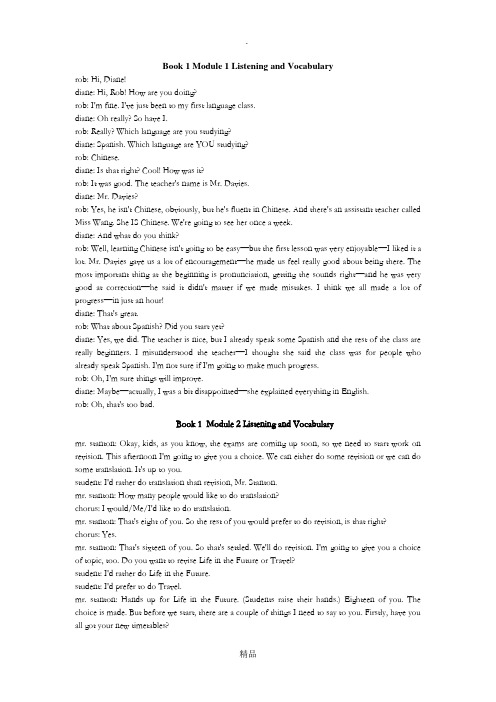
Book 1 Module 1 Listening and Vocabularyrob: Hi, Diane!diane: Hi, Rob! How are you doing?rob: I'm fine. I've just been to my first language class.diane: Oh really? So have I.rob: Really? Which language are you studying?diane: Spanish. Which language are YOU studying?rob: Chinese.diane: Is that right? Cool! How was it?rob: It was good. The teacher's name is Mr. Davies.diane: Mr. Davies?rob: Yes, he isn't Chinese, obviously, but he's fluent in Chinese. And there's an assistant teacher called Miss Wang. She IS Chinese. We're going to see her once a week.diane: And what do you think?rob: Well, learning Chinese isn't going to be easy—but the first lesson was very enjoyable—I liked it a lot. Mr. Davies gave us a lot of encouragement—he made us feel really good about being there. The most important thing at the beginning is pronunciation, getting the sounds right—and he was very good at correction—he said it didn't matter if we made mistakes. I think we all made a lot of progress—in just an hour!diane: That's great.rob: What about Spanish? Did you start yet?diane: Yes, we did. The teacher is nice, but I already speak some Spanish and the rest of the class are really beginners. I misunderstood the teacher—I thought she said the class was for people who already speak Spanish. I'm not sure if I'm going to make much progress.rob: Oh, I'm sure things will improve.diane: Maybe—actually, I was a bit disappointed—she explained everything in English.rob: Oh, that's too bad.Book 1 Module 2 Listening and Vocabularymr. stanton: Okay, kids, as you know, the exams are coming up soon, so we need to start work on revision. This afternoon I'm going to give you a choice. We can either do some revision or we can do some translation. It's up to you.student: I'd rather do translation than revision, Mr. Stanton.mr. stanton: How many people would like to do translation?chorus: I would/Me/I'd like to do translation.mr. stanton: That's eight of you. So the rest of you would prefer to do revision, is that right? chorus: Yes.mr. stanton: That's sixteen of you. So that's settled. We'll do revision. I'm going to give you a choice of topic, too. Do you want to revise Life in the Future or Travel?student: I'd rather do Life in the Future.student: I'd prefer to do Travel.mr. stanton: Hands up for Life in the Future. (Students raise their hands.) Eighteen of you. The choice is made. But before we start, there are a couple of things I need to say to you. Firstly, have you all got your new timetables?chorus: Yes.mr. stanton: Good. Can you take a look at them? OK. Now, at present you have a free period on Tuesday afternoons. Well, that's been changed and you've got French instead. Have you got that? chorus: Yes.mr. stanton: Excellent. And there's one other thing. The headmaster wants to see everyone in the library at three this afternoon. OK?chorus: Yes.mr. stanton: Right. Let's begin our revision of Life in the Future.Book 1 Module 3 An Interviewinterviewer: Tell me, Mary, where were you born?mary lennon: I was born in London.interviewer: Really? And when did you go to America?mary lennon: In 1934, when I was 19 years old, I went to New York.interviewer: Is that right? Did you travel by plane?mary lennon: By plane? No, of course not! We travelled by ship!interviewer: Goodness! How long did that take?mary lennon: About seven days.interviewer: Did you enjoy it?mary lennon: No! I hated it!interviewer: Why? Were you sick?mary lennon: No! I was bored!interviewer: Who invited you to go to America? And who paid for your ticket?mary lennon: To be honest, I can't remember. A film producer, I think.interviewer: What did you do in New York?mary lennon: Well, I met a lot of people, and I went to some parties. But I was there to make films and the film studios were in California, on the other side of the country, you see. So I went to California.interviewer: How did you get from New York to California?mary lennon: By train.interviewer: Did you like that?mary lennon: Oh yes, definitely! I loved travelling by train.interviewer: How long did the journey take?mary lennon: Well, in those days, you could travel from New York to Los Angeles in about a week. interviewer: Really?mary lennon: Yes. We stopped in Chicago for a few days.interviewer: Oh, I see.mary lennon: I think it was two weeks before I arrived in Los Angeles.interviewer: And what happened when you arrived in Los Angeles?mary lennon: Absolutely nothing. I did nothing for weeks!interviewer: What did you think of Los Angeles?mary lennon: It was too hot!Book 1 Module 4 An InterviewTape1interviewer: Mr. Yang, you're from Nanchang, aren't you? And am I right in thinking that you've lived here all your life?yang hua: Yes, I was born in this street.interviewer: Really! And you work for an organisation called "the neighbourhood committee", is that right?yang hua: Yes, I've worked for it for four years now. It's been very interesting.interviewer: We don't have such organisations in France. What kind of work does the committee do? yang hua: A great many things. Our job is to look after the neighbourhood.interviewer: Can you give us some examples?yang hua: Yes ... Umm, for example, we've started a holiday club for children. A lot of children have joined it. It's done very well.interviewer: Yes, we have that kind of thing in France.yang hua: And we've begun a neighbourhood watch, where people watch the houses and streets. It's been very successful, so far. The streets are safer as a result.interviewer: Congratulations!An InterviewTape2interviewer: You've just completed a survey of the neighbourhood, haven't you?yang hua: Yes, it's been fascinating. In the past we didn't known much about the people who live in our area. Now we have a lot more information.interviewer: I'd be interested to hear some of the figures.yang hua: Well, there are 850 households.interviewer: So it's quite a small area.yang hua: Yes, it is. The total population is 2 800.interviewer: 2 800. Have you collected any information about occupations?yang hua: Yes, we've got 322 professional people, teachers, etc. There are 517 office workers, 378 people in manual work and 280 students. There are 183 people working in local shops like the butcher's and the greengrocer's.interviewer: I see. What about the number of adults in employment?yang hua: We make it 1 400. We've certainly done our best to help people find employment. interviewer: I'm sure you have!Book 1 Module 5 Listening and Writingmr. chen: OK, boys and girls, we're going to do an experiment. Come a bit closer. The closer you are, the more you'll see! That's right! Now, what's the aim of this experiment, Zhou Kai?zhou kai: We want to find out if there's a change in weight when magnesium burns in air.mr. chen: That's right. So what do we need first?zhou kai: Um ... We need some magnesium. How much do we need? What about this piece? Is this piece OK?mr. chen: No, we need rather more than that—about two and a half grams. We need a piece which is much bigger than that.zhou kai: OK ... And we need a Bunsen burner ... a balance ... and a crucible to put the metal in ... Here they all are ... Where do we go from here?mr. chen: Well, first, put the magnesium in the crucible. Then put the crucible on the balance and weigh it.zhou kai: OK...mr. chen: How much does it weigh? Take a look, everyone. Is it any heavier?zhou kai: Um ... It weighs two and a half grams. Do you want me to write that down?mr. chen: Yes, write it down. What next?zhou kai: Yes ... Um, next, we're going to heat the magnesium. So I light the Bunsen burner. After that, I hold the crucible over it ... Oh look, it's burning with a white light! It's getting brighter and brighter!mr. chen: It's pretty, isn't it? Keep the noise down, boys and girls, please.zhou kai: Um ... lastly, we need to weigh the magnesium again ... It weighs four grams now.mr. chen: So what does that tell you?zhou kai: It weighs a little more than before.mr. chen: How much more?zhou kai: 1.5 grams more.mr. chen: And what does that mean?zhou kai: It means that there is a change in weight when magnesium burns in air.mr. chen: You've got it! Well done! So now, let's do the same experiment with copper. Come along, Li Kang, it's your turn now. What do you think will happen if you heat copper?li kang: I think it'll be a lot heavier than magnesium. Shall I begin?mr. chen: Yes, go ahead!Book 1 Module 6 Listening and Vocabularyinterviewer: Hello and welcome to Education Today. Today, we're talking about the Internet. Is the Internet a good thing for education? With me in the studio are Ann Baker, who's a teacher, Tom Grant, who's 17 and still at school, and Tom's mother Pat. Welcome to the show, everyone. If I can talk to you first, Ann, do you think that the Internet is a good thing or a bad thing?ann: Well, there are good and bad things about the Internet, but I think we should concentrate on the good things. The Internet has fantastic information about all kinds of things, and for this reason I think it's very good for students to use it.interviewer: Do you allow your students to use the Internet during school time?ann: Absolutely! They have Internet classes once a week. It's a chance for them to do some independent work. I make sure they have a reason to use the Internet.interviewer: What do you think are the bad things about using the Internet?ann: Well, we all know that there are some terrible sites on the Internet. We must make sure that students look for information on interesting and useful sites.interviewer: I see. Thank you. Well, I also have Pat and Tom Grant with me. Tom, how often do you use the Internet?tom: Every day.interviewer: At school or at home?tom: At school and at home.interviewer: How much time do you spend on the Internet at home?tom: As much time as I can. About five hours.interviewer: Five hours a week?tom: No! Five hours a day!interviewer: And what do you do on the Internet? Do you study?tom: Yes, it's good to study on the Internet.interviewer: Is it better than studying at school?tom: Well, they're different. I like studying at school as well.interviewer: Pat, what do you think about that?pat: Well, I'm happy when Tom is studying on the Internet, but he doesn't always study. interviewer: What do you mean?pat: Well, there are a lot of music sites that he likes. And he spends a lot of time reading about his favourite football team.interviewer: So you would prefer it if he didn't do that.pat: No—I want him to study and enjoy himself. But studying is important. And studying from books is important.interviewer: More important than studying on the Internet?pat: Studying is the important thing.如有侵权请联系告知删除,感谢你们的配合!。
外研版高二英语选修6_Module2_Reading_and_Vocabulary_课后练习
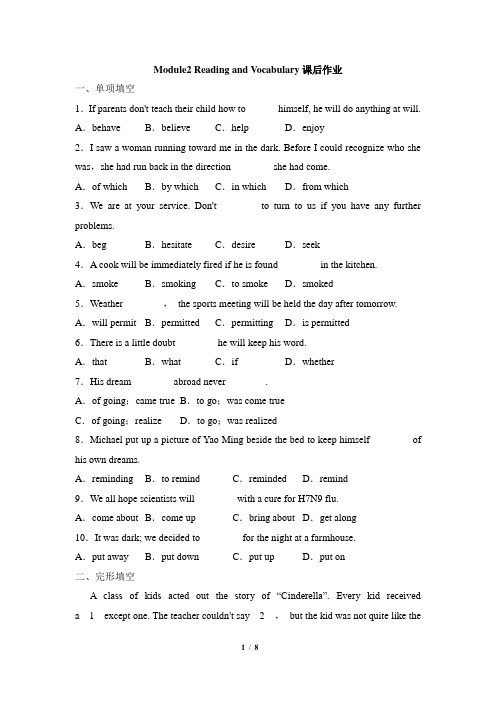
Module2 Reading and Vocabulary课后作业一、单项填空1.If parents don't teach their child how to______ himself, he will do anything at will. A.behave B.believe C.help D.enjoy2.I saw a woman running toward me in the dark. Before I could recognize who she was,she had run back in the direction________ she had come.A.of which B.by which C.in which D.from which3.We are at your service. Don't________ to turn to us if you have any further problems.A.beg B.hesitate C.desire D.seek4.A cook will be immediately fired if he is found________ in the kitchen. A.smoke B.smoking C.to smoke D.smoked5.Weather________,the sports meeting will be held the day after tomorrow. A.will permit B.permitted C.permitting D.is permitted6.There is a little doubt________ he will keep his word.A.that B.what C.if D.whether7.His dream________ abroad never________.A.of going;came true B.to go;was come trueC.of going;realize D.to go;was realized8.Michael put up a picture of Yao Ming beside the bed to keep himself________ of his own dreams.A.reminding B.to remind C.reminded D.remind9.We all hope scientists will________ with a cure for H7N9 flu.A.come about B.come up C.bring about D.get along10.It was dark; we decided to ________for the night at a farmhouse.A.put away B.put down C.put up D.put on二、完形填空A class of kids acted out the story of “Cinderella”. Every kid received a__1__except one. The teacher couldn't say__2__,but the kid was not quite like therest. So she asked, “Norman, what are you going to be?” “I will be a__3__.”“But there's no pig in this story.” And Norman said, “Well, there is one now.”No one knew how to__4__a pig into the story. But Norman knew__5__what his part was. His idea was to__6__Cinderella wherever she went and to do whatever she did. Norman had__7__to say, but his face reflected(表达)the action of the play.__8__things were serious, he was serious. When things looked worrisome, he looked__9__. And at the end of the performance, when Cinderella was carried off to live happily, Norman stood there and barked. The teacher__10__,“Norman, although there is a pig in the story, pigs do not__11__.” And Norman said, “Well, this one does.”Word__12__,and many people called up the teacher and asked what was__13__about it. She said, “Well, there is a pig in it__14__a barking pig.” And the person on the other end of the__15__would say, “But there is no barking pig in Cinderella.” The teacher said, “Well, there is now.”This teacher was Sophia Smith. She herself was a barking pig. She said there should be a college for women,__16__people said there was no such thing before. Her__17__was, “Well, there is now.”I__18__think of the Cinderella story and like it very much, because Norman, the barking pig, got up and__19__that there should be room for him in this world. This is a story which gives us much __20__.1.A. book B.gift C.role D.letter2.A. how B.where C.when D.why3.A. pig B.dog C.student D.waiter4.A. put B.make C.fit D.throw5.A. exactly B.finally C.slowly D.suddenly6.A. play with B.mix with C.go with D.agree with7.A. anything B.everything C.something D.nothing8.A. How B.Why C.Whether D.When9.A. pleased B.excited C.surprised D.worried10.A. cried B.shouted C.laughed D.joked11.A. bark B.cry C.smile D.sing12.A. spread B.failed C.passed D.came13.A. strange B.special C.useful D.important14.A. actually B.almost C.luckily D.probably15.A. street B.telephone C.row D.Internet16.A. and B.but C.or D.for17.A. reply B.ask C.explanation D.reason18.A. never B.seldom C.always D.once19.A. ordered B.requested C.suggested D.said20.A. encouragement B.happinessC.sadness D.experience三、阅读理解There's a new kind of game on the Internet. When you play it, you do more than simply get points or have fun. As you play, you help computers develop new skills. Computer scientist Luis von Ahn created the games as a way to solve problems that are difficult for computers, even though the problems may seem simple to us. Computers, for example, have a hard time identifying a cat in a photo, while we can spot a cat at a glance.The idea is to invent online games that people enjoy playing. Then, as people play, they provide data that researchers can use to improve computers. The players don't know that they're helping out. They're just having fun.“The potentials huge,” says computer scientist Manuel Blum, one of von Ahn's colleagues at Carnegie Mellon University in Pittsburgh. “These games with a purpose make use of humans in a wonderfu l way.”By harnessing the brainpower of thousands of people playing games on the Internet, computers may learn how to identify pictures, translate Web pages into forms that blind people can use, develop common sense, understand foreign languages, and more.Our brains are made to collect and process lots of information about what we see,von Ahn says.Computers, on the other hand, simply “see” a grid of dark and light dots, called pixels. It's not obvious to a machine that a certain blob is a cat. Likewise a computer doesn't know that a tiger, a cartoon feline, and a kitty curled up on a couch all belong in the same category: cat.“If you give me an image of some common animal, I can tell you if it's a cat or a dog,” von Ahn says. “Computers can't do that yet.”Because computers can't make such distinctions, search engines have a hard time finding images on the Internet, and getting people to label each image doesn't work well. There are billions of images, and the job is pretty boring.1.The new kind of game on the Internet created by Luis von Ahn can mainly________.A.help us have fun at any timeB.help the computer spot a catC.help the computer solve problemsD.help us relax by playing it2.People like playing online games because________.A.they enjoy having fun by playing themB.they want to improve their playing skillsC.they want to make money by playing gamesD.they want to solve the problems with computers3.The main difference between our brains and computers is that________.A.we can identify everything while computers can't do it at allB.the computers do what people tell them to, which we can not doC.our brains can collect information while computers can only identify dots D.we can recognize a computer while a computer can not recognize us 4.Computer scientists control the brainpower of people playing games on the Internet to________.A.get personal information to make lots of moneyB.make computers faster and safer than beforeC.ask them to translate Web pages into forms that blind people can use D.get information to solve problems that are difficult for computers5.We can learn from the passage that________.A.people may refuse to play online games when they know what they are for B.more and more online computer games may be createdC.people's brains will become better after they play computer games D.scientists will solve the problems with the help of game players参考答案与解析一、1.A behave oneself守规矩,符合句意。
外研版一起点小学英语六年级上册课本知识点汇总
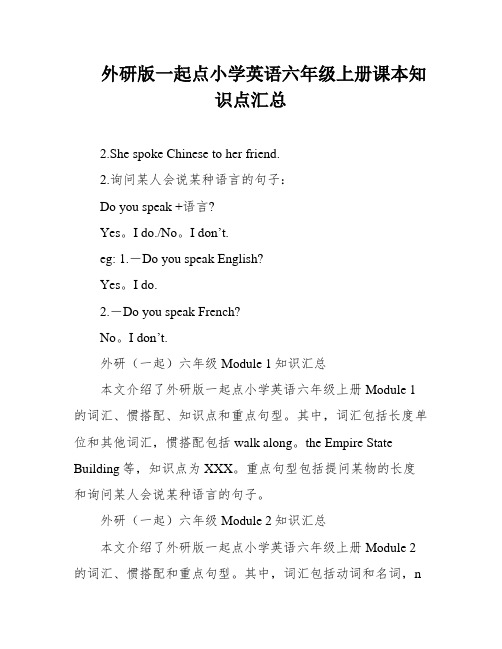
外研版一起点小学英语六年级上册课本知识点汇总2.She spoke Chinese to her friend.2.询问某人会说某种语言的句子:Do you speak +语言?Yes。
I do./No。
I don’t.eg: 1.-Do you speak English?Yes。
I do.2.-Do you speak French?No。
I don’t.外研(一起)六年级Module 1知识汇总本文介绍了外研版一起点小学英语六年级上册Module 1的词汇、惯搭配、知识点和重点句型。
其中,词汇包括长度单位和其他词汇,惯搭配包括walk along。
the Empire State Building等,知识点为XXX。
重点句型包括提问某物的长度和询问某人会说某种语言的句子。
外研(一起)六年级Module 2知识汇总本文介绍了外研版一起点小学英语六年级上册Module 2的词汇、惯搭配和重点句型。
其中,词汇包括动词和名词,ndance、send an email等,重点句型包括描述自己过去做过的事情和询问某人会说某种语言的句子。
外研(一起)六年级 Module 3 知识汇总一、词汇名词:邮票(stamp)、太阳(sun)、岛屿(island)、爱好(hobby)、簿、册(book)、椰子(coconut)动词:收集(collect)二、惯搭配收集邮票(collect stamps)发电子邮件(send emails)制作一本集邮册(make a stamp book)一张……的图片(a picture of。
)三、惯用表达太棒了!(Great!)四、重点句型:1.询问“某人是否有某物”的句型及其答语:Have you got。
Yes。
I have。
/ No。
I haven’t.例如:Have you got any stamps from China?Yes。
I have.Have you got a kite?No。
外研版Book6_Module2J.K.Rowling_and_Harry_Potter

4. Harry Potter stories are so appealing that they____
A: must be included in the school curriculum B: are shown on television in other countries C: encourage children to read more D: have been criticised for bad style 5. The Harry Potter stories ____ A: can now read in only 50 languages
burden
v. 使负重, 加重压于
词组: burden sb. with... 让某人负担
be burdened with/ by sth.
肩负…的重担
e.g. 1. 我不想以我的烦恼来加重她的负担. I don’t want to burden her with my troubles. 2. 他肩负家庭的重担. He is burdened with/by his family.
6. Harry Potter has even become part of the school curriculum, much to the pleasure of the schoolchildren. 使孩子们特别开心的是,哈利· 波特甚至已经 成为了学校课程的一部分. 用法: To the pleasure of the schoolchildren = to schoolchildren’s pleasure. To his father’s surprise= to the surprise of his father.
上海市金卫中学七年级英语上册Module+1+Unit+2+单元验收卷(无答案)
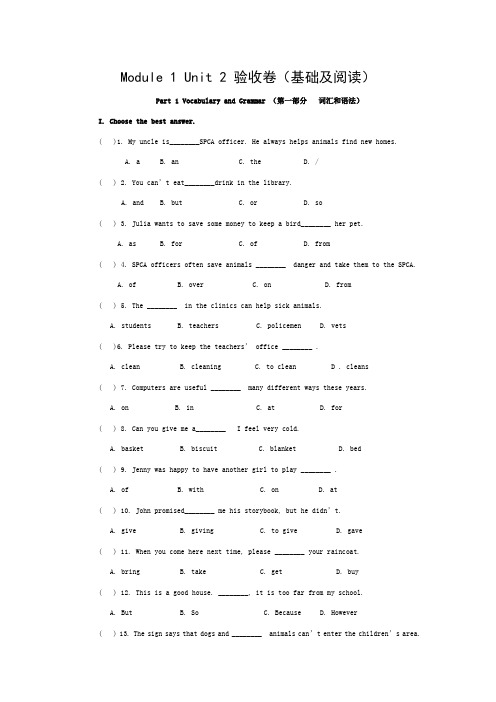
Module 1 Unit 2 验收卷(基础及阅读)Part 1 Vocabulary and Grammar (第一部分词汇和语法)I. Choose the best answer.( )1. My uncle is________SPCA officer. He always helps animals find new homes.A. aB. anC. theD. /( ) 2. You can’t eat________drink in the library.A. andB. butC. orD. so( ) 3. Julia wants to save some money to keep a bird________ her pet.A. asB. forC. ofD. from( ) 4. SPCA officers often save animals ________ danger and take them to the SPCA.A. ofB. overC. onD. from( ) 5. The ________ in the clinics can help sick animals.A. studentsB. teachersC. policemenD. vets( )6. Please try to keep the teachers’ office ________ .A. cleanB. cleaningC. to clean D . cleans( ) 7. Computers are useful ________ many different ways these years.A. onB. inC. atD. for( ) 8. Can you give me a________ I feel very cold.A. basketB. biscuitC. blanketD. bed( ) 9. Jenny was happy to have another girl to play ________ .A. ofB. withC. onD. at( ) 10. John promised________ me his storybook, but he didn’t.A. giveB. givingC. to giveD. gave( ) 11. When you come here next time, please ________ your raincoat.A. bringB. takeC. getD. buy( ) 12. This is a good house. ________, it is too far from my school.A. ButB. SoC. BecauseD. However( ) 13. The sign says that dogs and ________ animals can’t enter the children’s area.A. anotherB. otherC. othersD. the others( ) 14. During the holiday, Billy usually helps his father work ________ the farm.A. onB. inC. ofD. across( ) 15. We shouldn’t ________ our pets in the street when we don’t like them.A. throwB. keepC. liveD. leave( ) 16. —Do you still remember ________ he came here—Yes, I do. He came by bus.A. whenB. whatC. howD. why( ) 17. Mike ________ his present on the desk two hours ago.A. putsB. is puttingC. has putD. put( ) 18. I’d like ________ soccer with my friends after school.A. to playB. playingC. playD. to playing( ) 19. Jack prefers the book with a lot of pictures. The underlined part means “________”.A. likes bestB. hatesC. likes betterD. reads( ) 20. —Thank you very much for telling me the way.—________A. Don’t thank me.B. You’re welcome.C. No thanks.D. You needn’t.II. Complete the following passage with the words or phrases in the box. Each word can only be used once(将下列单词或词组填入空格。
外研 必修五Module 1 Reading and vocabulary
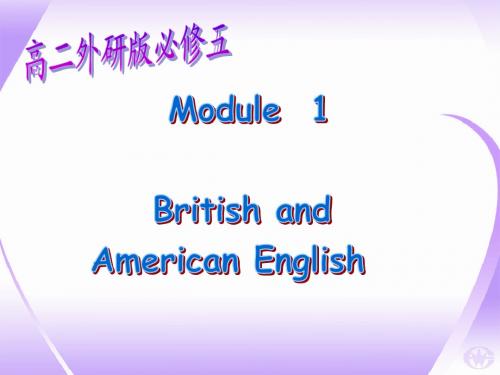
Complete the sentences with the correct words or phrases. (Activity 3, P3) 1. There are ____ differences between American and British varieties of English. A. no B. a few C. lots of 2. Americans ____ understand what the British are saying. A. sometimes B. usually C. never 3. There are ___ differences between British and American grammar. A. no B. many C. not many
Read the titles and the first sentences of each paragraph and find four ways in which British and American English are different. (Activity 2, P2) • vocabulary • grammar • spelling • pronunciation
freeways gas subway cab flashlight stand in line French fries
chips(薯条)
crisps
Examples British English American English
Have you got …?
Do you have …?
Differences My friend has just arrived in in the team grammar at the weekend
外研版英语选修六Module1课文

外研版英语选修六课文Module 1Module 1 Small Talk IntroductionRead the dictionary definitions of small talk and answer the questions.1.Which definitions make small talk sound like a positivething?2.Which definitions refer to places where small talk mighttake place?3.Why is it a problem if someone has no small talk?4.What do you think is the Chinese for "small talk"?small talk informal conversation about thingsthat are not importantMacmillan English Dictionary small talk light conversation that people make at social occasions about unimportant things: We stood around making small talk.Collins Cobuild English Language Dictionarysmall talk polite friendly conversation about unimportant subjectsLongman Dictionary of Contemporary English small talk conversation about ordinary or unimportant matters, usually at a social event: He has no small talk (i.e. he is not good at talking to people about ordinary or unimportant things).Oxford Advanced Learner's Dictionary Look at the conversation topics below and answer the questions. careers; cars; examinations; film stars; music; politics; sport; travel; weather; food1.I f you talk about these topics, isthe conversation serious or small talk?2.W hich of the topics do you liketalking about with your friends?3.W hich of them do you talk about with your parents?4.W hich of them do you talk about with your teacher?5.W hich of them do you never talk about?Vocabulary and ReadingComplete the sentences with the correct forms of the words in the box.damage; encourage; impress; prepare; recognise1.T2.H3.Dto do better.4.Mmore homework!5.Aschool.Read the passage and decide what kind of book it is from. Choose from this list.The text is from ____.a book to help you prepare for a speaking examinationa business coursean English teaching booka book which tells you what to do at social eventsHow Good Are Your Social Skills?Have you ever crossed the road to to someone you recognise? to a party and talk to every guest? Do you want to but to talk to people you don't know? And the idea of being at a social event in another country? Don't worry—we can help you!You needn't worry about situations like these if you have good social skills. And they are easy to learn. People with good social skills communicate well and know how to have a conversation. It helps if you do a little planning.Here are a few ideas to help you.Learn how to do small talkis very important and prepares you for more conversations. ! Have some low-risk ready. For example:a recent news story—not too , e.g. a story about afilm star or sports starthings to tell people about your studiesyou can ask people's opinions about—music, sport, films, etc.topics that you would avoid if you were talking to strangers—and avoid talking about them! That way, youdon't !Develop your listening skillsListening is a skill which most people , but communication is a two-way process—it involves speaking AND listening. Always remember—you won't impress people if you talk too much. Here are some ideas to make you a better listener:Do ...show that you are listening by using encouraging noises and gestures—smiling, nodding, saying "uh-huh" and"OK", etc.keep good eye contactuse positiveask for more information to show your interestDon't ...look at your watchthe person who's talking to youchange the subjectfinish other people's sentences for themAlways remember the words of Benjamin Disraeli, British Prime Minister in the nineteenth century: "Talk to a man about himself, and he will speak to you for hours!"Learn the rulesIf you go to a social occasion in another country, remember that can be different. In some countries, for example, you have to arrive on time at a party; in other countries, you don't need to. , you need to know how long you should stay, and when you have to leave. Some hosts expect flowers or a small gift, but in other places, you can take things, but you needn't if you don't want to. Remember also that in some countries, you mustn't take flowers of a colour, because they're unlucky. In most places, you don't have to take a gift to a party—but first!Answer the questions.1.According to the article, should people plan what they're going to say at parties?2.What do people think about those who talk too much?3.Describe two things you shouldn't do in a conversation.4.Why is it a good idea to nod and smile when the other person is talking?5.What does the quotation from Benjamin Disraeli tell you about people?Complete the sentences with the correct forms of the words in the box.sigh; yawn; nod; avoid; lack; smile1.personal questions.2.meet people from other countries.3.head in agreement.4.I think the man I spoke to was tired—5.6.my hand.Look at the phrases from the passage and answer the questions.1.If you can talk confidently, does this mean that you are worried about talking topeople?2.What kind of advance planning could you do before going to a party in a foreigncountry?3.Can you give an example of a low-risk conversation opener if you were talking to afriend of your parents', for example?4.What encouraging noises and gestures can you make when you're having a conversation inChinese?5.What is an example of positive body language?6.Are social rules the same in every country?Discuss your answers to the questions.1.Which of the ideas in the reading passage do you think are useful in your society?2.Are there any conversation techniques that you think you will use in the future?3.Which of the listening skills are you good at?4.Which of the social skills do you need to improve?5.What are some of the usual small talk topics in China?FunctionRead the pairs of sentences and answer the questions.1.Y ou must arrive on time at a party.You have to arrive on time at a party.2.Y ou mustn't take yellow flowers for the host.You don't have to take yellow flowers for the host.3.Y ou don't have to take a gift.You don't need to take a gift.1. Which of the following is true about the first pair ofsentences?The first one is an obligation, the second one is asuggestion.They both indicate an obligation.They are only suggestions about what to do.2. Which of the following is true about the second pair of sentences?The first one indicates that something is against the law.They mean the same thing.The first one is an obligation, the second oneindicates a lack of obligation.3. Which of the following is true about the third pair ofsentences?The second one is an obligation, the first one isn't.They mean the same thing.The first one is an obligation, the second one isn't. Write three rules for a social event in your country.If you go to a social event in my country,1.y ou have to ____.2.y ou don't have to ____.3.y ou mustn't ____.4.Look at the two sentences and decide which explanation iscorrect.1. We all know each other. We don't need to worry aboutsmall talk. This means ____.it isn't necessary to worry about itunfortunately we worry about it2. The party is informal. You needn't wear a tie. Thismeans ____.we must not wear a tiewe can wear a tie if we chooseComplete the sentences with verbs to express obligation or lack of obligation.1.SIt's unlucky!2.D3.Iprizes have been given.5.Yvery pleased if you do.Reading and ListeningRead and match the conversations with the places. There is one extra place.at a summer school; during a job interview; in a business meeting; on a boatA:Wonderful, aren't they?B:Er ... I'm sorry?A:The cliffs.B:Oh, yes, they are. A:Been here before? B:Pardon?A:So ... you wrote in your application form that you're interested in mountains.B:Yes.A:Have you ever climbed a mountain?B:No.A:Have you ever read any books about mountain-climbing? B:No.A:When did you arrive?B:Yesterday.A:Nice journey?B:Very nice.A:Did the immigration people ask to see your visa?B:I didn't need to get a visa.A:Really? Why not?B:Because I was born here.A:Oh yes, of course!Answer the questions about the conversations.1.D o you think the conversations are between people whoknow each other? Give reasons for your answers.2.W hich of the conversations would you call small talk?3.W hat do you think about the answers in the interview?a.The answers show that the interviewee isinterested in the job.b.The answers are too short.c.The answers are impolite.Listen to the whole of the first conversation and answer the questions.1.D o the people both speak English as a first language?2.W hy did the woman have problems understanding what theman was saying?3.H ow did the man help her to understand him better?4.Listen and check. Choose the correct endings to the linesfrom the conversation.1. Sorry, I couldn't ____.hear what you saidunderstand what you said2. I didn't ____.like what you saidcatch what you said3. Could you ____?repeat what you saidexplain what you said4. You needn't have ____.spoken to mespoken so slowly5. I just needed a few seconds ____.to get used to your voiceto understand your voiceGrammarRead the sentence from the listening passage and answer the questions.You needn't have spoken so slowly.1. Who said this?the touristthe English person2. Why did she say it? Choose one of these possible reasons.The other person was speaking too quickly.The other person was speaking too slowly.The other person was speaking slowly and it wasn'tnecessary.Rewrite these sentences using needn't have done.1.I t wasn't necessary for you to bring some flowers!You needn't have brought some flowers.2.T hank you for tidying the room—but it wasn'tnecessary.3.There was no need for you to buy the box of chocolates.4.Why did you go to school? It's Sunday!5.T hank you for bringing the book to show me, but Ialready have it.Read the sentence and decide which endings are possible.I didn't need to buy a gift for my host family ____.so I didn't get onebecause I already had oneso I bought oneso I took it back and got a refundComplete the sentences using didn't need to or needn't have done.Example:It was an informal party so I didn't need to wear (wear) a suit.1.W e brought some food to the party but there was too2.Mthe speech for him.3.The office had already opened when we arrived so we4.I got to the party at 6 p.m. but there was no one5.I told the host all about my home town and then heReading and WritingRead the email.Hi! How are you? I hope you and your family are well.I have a favour to ask. Next week, I'm going to a reception at the Chinese Embassy here in London and I'm really looking forward to it. I'm going to meet some senior high school students and their teachers. The only problem is that I'm not very good at small talk with people I don't know—I'm always worried about saying the wrong thing or making people feel bored.I need to know what I can talk about with the Chinese people that I meet. I wonder if you would be kind enough to answer these questions.Here in England, there are certain questions that you shouldn't really ask people that you don't know—"How old are you?" for example, and "How much do you earn?" Are there any questions that you shouldn't ask people in China?What sort of things do Chinese teenagers like talking about? Sport? Music? Films? And what sort of things do they find boring? Politics? The weather?Looking forward to your reply.AlexWrite a reply. Answer the main questions and offer other advice. Use some of the following sentences to start and finish your email.Very nice to hear from you.Thank you for your interesting email.How are you? It's a long time since I heard from you.I hope this information has been useful.Best of luck at the Chinese Embassy.Looking forward to hearing from you again soon. Reading and VocabularyYou're going to read a story about a saleswoman. Discuss what kind of small talk you need as a salesperson.The Wrong Kind of Small TalkEsther Greenbaum was a for a of machines and business supplies. But she was also the most in the world—well, Westchester County, at least. Her was "Every time I open my mouth, I ."Esther Greenbaum's major was that she had a complete of . No, that's not quite true. She had , but it was the wrong kind. In fact, she had never learnt the basic rules of socialcommunication, and , she made mistakes every time she opened her mouth. either that she wasn't a very good .One day during a meeting, Esther was introduced to an important , a woman."Nice to meet you," she said. "How old are you?" The looked ."Forty? Forty-five?" said Esther. "You look much older. And your friend ... she's older than you, but she looks much younger!"On another occasion, Esther teased a , "Hey! When's your baby due?"The went red and contradicted Esther. "Actually, I'm not ," she said."Oh, sorry," said Esther without any . "Just putting on a little weight, huh?"Esther was never about other people's feelings. One of her acquaintances, a salesman in the , was going through a very and was very depressed. She tried to cheer him up."Forget her! She was a complete . No one liked her anyway."Much of the time, Esther said the first thing to come into her head. One day at work, a came into the office with a new hairstyle."Nice ," said Esther. "How much did it cost?"The woman replied, "I'd rather not say."Esther replied, "Well, , either you paid too much or you paid too little."She met a very famous writer once. "Hey, what a !" she said. "You're writing a book and I'm reading one!"The trouble with Esther was she said what she thought, and didn't think about what she said. A young man was trying to be about his new job many miles away."I guess the company chose me so they'd get some peace in the office," he smiled."No, I guess they chose you to discourage you from spending your whole career with us," Esther replied sweetly.Once, Esther went to a party to meet some old school friends on the of their graduation. She greeted the ."Do you remember that guy you were dating? What happened to him?" she asked. "You know, the ugly one."At that moment, a man came up and stood by her friend. "Esther, I'd like you to meet my husband," she said. "Charles, this is ..."Esther interrupted her, "Hey, so you married him!"Read the passage and answer the questions.1.W hat did Esther often do when she spoke to others?2.W hat do you think are "the basic rules of socialcommunication"?3.W hy did the customer look awkward when she was askedhow old she was?4.H ow did the typist contradict Esther?5.W hat was wrong about Esther's advice to the salesman?6.W hat did Esther think of the clerk's haircut?7.W hy did the young man think the company gave him a newjob miles away?8.W hat did Esther think of her old school friend'shusband?Read the passage and find:1.t hree things you can say when you make small talk2.t wo things you should not say3.o ne way of replying to questions which you don't wishto answer4.The style of this passage is meant to be humourous andexaggerated.Example:You look much older. And your friend, she's older than you, but she looks much younger!5.Look for more examples of humour and exaggeration in thepassage.Look at the new words in the box.absence; acquaintance; anniversary; apology; awkward; brunch; cautious; clerk; customer; fax; firm; fool; haircut; hostess; human being; interrupt; mature; messy; motto; outspoken; pregnant; saleswoman; shortcoming; tease; typistFind words for:1.a2.p3.t4.p5.a6.aNote: Not all the words fit these categories.Answer the questions about the words in the box.absence; acquaintance; anniversary; apology; awkward; brunch; cautious; clerk; customer; fax; firm; fool; haircut; hostess; human being; interrupt; mature; messy; motto; outspoken; pregnant; saleswoman; shortcoming; tease; typist1.W hen is the next important anniversary in your life?2.D o people ever tease you?3.C an you think of a personal motto?4.W hen was the last apology you have given or received?5.W hat are you cautious about?6.D o you know anyone who is outspoken?Discuss the questions and give reasons for your answers.1.I s small talk important in your society?2.I s it as important as "real" conversation?3.D o you think small talk is more or less important inEnglish than in your language?Reading PracticeLook at the title of the passage and the words in the box. Choose five words and guess what the writer uses them to say.argument; compliment; conversation; curious; disagreement; dull; embarrassment; factual; genuine; hospitable; lively; relationship; sensitive; secretive; silence; spy; topic; violate; wealthMaking Friends in the USAIn the USA, conversation is less lively than in many other cultures, where everyone talks at the same time. When someone talks, everyone is expected to listen, no matter how dull the person's speaking may be.If you're not sure what to talk about, you can ask what people do. We're defined by our jobs and we're usually happy to talk about them, unless you're a spy!Some people say that Americans talk about their feelings more than Asians, but are more about matters. You can safely ask questions about families, where you come from, leisure interests,as well as the latest movies. We're interested in people's ethnic background too. But it's best to avoid politics, religion and other sensitive topics.A highly personal conversation can take place after a very short period of knowing someone, but this doesn't mean that you're close friends, or the relationship is very deep. But a lot of people are very friendly and , and the famous invitation "If you're ever in Minneapolis / San Diego / Poughkeepsie, do call by and see us!" is never made without a desire to meet again.But while few Americans will worry about the questions you may ask, particularly if you clearly show you're aware of cultural differences, they may hesitate before they ask you similar questions. In fact, it's a sign that they don't wish to your private life. So, many Americans will talk about safe topics because they don't dare to be too curious or personal, but will happily talk about more private matters if you .Generally we dislike arguments, and we avoid topics which lead to disagreement. It's easy to return to discussing the weather: "Do you like the USA? How do you like the weather?" or making compliments: "What lovely flowers and what a beautiful vase!""That's a fabulous dress you're wearing." You should accept compliments and say "Thank you!"There are a couple of dangerous topics of conversation: age and money. Age is not treated as something very special, unless someone is very old: "Isn't she wonderful for her age!" and there are no special rules or signs of extra respect for elderly people. Anyway, Americans always want to look younger than they really are, so don't expect an accurate !Income is a very private matter, and you'd do well to avoid asking how much people earn, although some people may not only be open about it, but their wealth. We don't ask how much things cost, either.But what we don't like is silence, and almost anything is better than the embarrassment of a quiet party and silent guests. Read the advice on small talk. Is it true for you?1.Y ou can ask about families, what people do and like,etc.2.I t's OK to talk about religion and politics.3.Y ou shouldn't talk about your feelings.4.D on't ask personal questions.5.M ake sure you don't talk about the weather or givecompliments.6.Y ou can talk about people's age and their income.7.Choose the correct answers.1. When a dull person talks, you should ____.not ask personal questionsask questionschange the topic of conversationlisten2. It's always OK to talk to Americans about ____.age and moneytheir workreligion and politicstheir private life3. When Americans make an invitation to visit, ____.they genuinely want to see you againthey don't really mean itThey want to find out more about youyou should accept it4. The best way to talk about personal things is to ____.discuss the weathertalk about your own private life firsttalk about your jobask them how old they are5. It's best to avoid ____.spiespersonal questionssilencedull peopleComplete the sentences in your own words.1.C onversation is less lively in the USA becauseeveryone ____.2.A mericans are happy to talk about family and personalinterests, but ____.3.I f you show you're aware of cultural differences, ____.4.Y ou shouldn't ask how old people are because ____.5.A lthough some people like to show off their wealth,____.Cultural CornerRead the passage and answer the questions.1.H ow does the AAA model work?2.I s the AAA model a good idea while making small talkwith someone you don't know in China?The AAAIt is estimated that 80% of all conversation in English is small talk. A very important function of small talk is to establish a relationship between people who don't know each other very well, or don't know each other at all.Psychologists say that the most successful formula for small talk between people like this is the AAA model. AAA = answer, add and ask. This is how it works.Imagine a situation where two strangers are talking to each other after someone they both know has left the room, or the café or party, etc. The first person asks a question:A:Do you live near here?The second person replies by answering the question, adding some extra information and then asking another question:B:(Answer) Yes, I do. (Add) In an apartment on Brown Street. (Ask) Do you live nearby too?The first person does the same, answer, add and ask:A:(Answer) No, I live in Bristol. (Add) I'm just visiting London. (Ask) Have you lived here long?B:(Answer) Not so long. (Add) I moved here three years ago. (Ask) What's the purpose of your visit to London?The speakers may have difficulty at first, but they soon realise that the important thing is that they are saying something. By continuing with the AAA model, the conversation continues. Because the thing they both want to avoid is an embarrassing silence.The conversation can continue in this way for a long time. However, something can happen that completely changes the atmosphere.B:Why do you live in Bristol?A:I'm studying there. History. Are you a student?B:Yes. And I know some people who are studying at Bristol. Do you know a girl called Helen Brown?A:Helen Brown!! Yes! She's one of my best friends! How do you know her?B:She's my cousin.At this point, the AAA model stops. Because they used this very useful social technique, they found something they have in common at last.。
外研版高中英语选修6培优练习Module 1 Small Talk Section Ⅰ
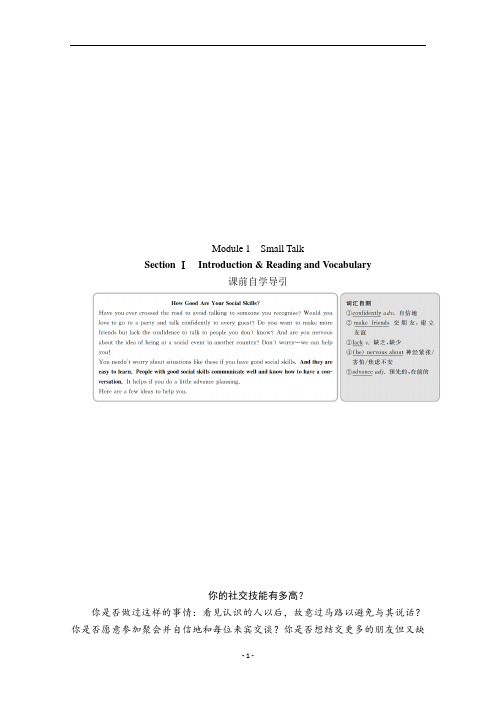
Module 1Small TalkSection ⅠIntroduction & Reading and Vocabulary课前自学导引你的社交技能有多高?你是否做过这样的事情:看见认识的人以后,故意过马路以避免与其说话?你是否愿意参加聚会并自信地和每位来宾交谈?你是否想结交更多的朋友但又缺乏与陌生人交谈的信心?你是否一想到要在别的国家参加社交活动就觉得忐忑不安?别担心——我们能帮助你!具备了良好的社交技能,你就不用担心这样的情景。
而这些技能是很容易学习的。
具有良好社交技能的人能很好地和别人交流并且知道该怎样说话。
要是预先做点准备,将会对你有所帮助。
下面为你出些主意。
学会怎样聊天聊天是很重要的,并能帮助你为一些更严肃的谈话做准备。
有备无患!准备好几个不太会出错的开场白。
例如:·想出一个最近的新闻故事——不要太严肃,譬如,一个有关于电影明星或体育明星的故事;·想出一些有关于你的学习的事情告诉别人;·想出一些“不会出错”的事情询问别人的意见——音乐、体育、电影等;·想出一些和陌生人谈话时要回避的话题——并且要避免谈论这些话题!那样,你的信心就不会被伤害了!提高倾听的技能倾听是大多数人所缺乏的技巧,而交流是双向的过程——它涉及说和听两个方面。
要永远记住——话太多并不会给人留下怎样的印象。
下面是一些使你成为更好的倾听者的方法:做下面的事情……·用一些鼓励的声音或姿势表示你正在倾听——微笑,点头,说一些“嗯”或“对啊”之类的话;·保持得体的目光接触;·使用积极肯定的肢体语言;·询问更多的信息表示你的兴趣。
不要做下面的事情……·看自己的手表;·打哈欠;·叹气;·把目光从正跟你说话的人身上移开;·改变话题;·替别人把话说完。
要牢记19世纪英国首相本杰明·迪斯累里的话:“和一个人谈论他自己,他会和你说上几个小时!”学习规则如果你在另一个国家去一个社交场合,要记住会有不同的社交规则。
六年级上册外研版英语第一模块的重要单词

六年级上册外研版英语第一模块的重要单词Important Words in the First Module of Grade 6, Volume 1 of the New Standard EnglishIn the first module of Grade 6, Volume 1 of the New Standard English textbook, there are several important words that students need to learn and understand. These words are essential for building a strong foundation in English language skills. Below, we will discuss these important words and their meanings.1. Hello - a common greeting used to start a conversation or to acknowledge someone's presence.2. Goodbye - a farewell greeting used when leaving someone or ending a conversation.3. Thank you - an expression of gratitude used to show appreciation for something done for you.4. Please - a polite word used to request something or ask for permission.5. Excuse me - a polite phrase used to get someone's attention or to apologize for something.6. Sorry - an expression of regret used to apologize for a mistake or wrongdoing.7. Yes - a positive response indicating agreement or affirmation.8. No - a negative response indicating disagreement or denial.9. What - a word used to ask for information or clarification.10. Who - a word used to inquire about a person's identity.11. Where - a word used to ask about the location of something or someone.12. When - a word used to inquire about the time or date of an event.13. Why - a word used to ask for the reason or cause of something.14. How - a word used to ask about the way or manner in which something is done.15. Friend - a person who is close to you and with whom you have a bond of mutual affection.16. Family - a group of people related by blood or marriage.17. School - a place where students go to learn and receive an education.18. Teacher - a person who instructs and guides students in their learning.19. Book - a written or printed work consisting of pages bound together.20. Pen - a tool used for writing or drawing, usually with ink.21. Pencil - a writing tool with a graphite or colored core encased in wood.22. Desk - a piece of furniture with a flat top and one or more drawers, used for studying or writing.23. Chair - a piece of furniture designed for one person to sit on, typically with a back and four legs.24. Classroom - a room in a school where students are taught by a teacher.25. Homework - tasks assigned to students by their teachers to be completed outside of class time.These important words are just a few examples of the vocabulary that students will learn in the first module of Grade 6, Volume 1 of the New Standard English textbook. Masteringthese words will help students communicate effectively in English and lay the groundwork for further language learning.。
- 1、下载文档前请自行甄别文档内容的完整性,平台不提供额外的编辑、内容补充、找答案等附加服务。
- 2、"仅部分预览"的文档,不可在线预览部分如存在完整性等问题,可反馈申请退款(可完整预览的文档不适用该条件!)。
- 3、如文档侵犯您的权益,请联系客服反馈,我们会尽快为您处理(人工客服工作时间:9:00-18:30)。
Book 6 Module 1 V ocabulary and Reading 课文学案I.自主预习Find out the phrases in the passage.1.聊天___________2. 交朋友____________3.对…紧张______________4.想起___________5.把目光从…移开_______________6.提前计划____________7. 低风险对话______________8.双向过程____________9.社交场合____________ 10. 除此之外___________II.合作探究1. Try to find the main idea of each part.Part 1. Develop your listening skillsPart 2 Learn some social rulesPart 3 How to do small talkPart 4 The trouble you meet When talking2.Read part 1 and fill in the blanks.①.Cross the road----- _________________________________________②. Go to a party------ __________________________________________③. Make new friends with strangers----________________________________________④.At a social event in another country--- _________________________________________3.Read part 2 and answer the questions.Having low-risk conversation openers ready:think of:①______________________②_______________________________________③_________________④____________________4.Read part 3 and answer the following listening skills.How to make yourself a good listener?Do… Don’t…_________________________ _____________________________________________________ ______________________________________________________ ________________________________________________________ ________________________________________________________ ______________________________III.精讲点拨1.Have you ever crossed the road to avoid talking to someone you recognize?1) cross v.______ 他举着手穿过马路。
He ______ the road with his hand ______.(crossed/up)2)避免做….____________我尽量避免遇到他因为他总使我厌烦。
I tried to avoid ______ him because he always ______ me.(meeting/bored)2. And are you nervous about the idea of being at a social event in another country?be nervous about…_________________他对这次考试很紧张,以至于觉都睡不好。
____________________________________3.People with good social skills communicate well and know how to have a conversation.句中how to have a conversation为______+_______结构。
疑问词_____/______/_______/_____/ _______及_____后加不定式,构成不定式复合结构,在句中可做____/______/_____/_______. 我不知道做什么。
_________________________.(I don’t know what to do.)我不知道如何做这件事。
I have no idea of _____ _____ _____ it.(how to do)He told us whether _______ a picnic was still under discussion.A. to haveB. havingC. haveD. had4. Small talk is very important and prepares you for more serious conversations.翻译:________________________________________________Be prepared! Have some low-risk conversation openers ready.翻译:_______________________________________________5.Talk to a man about himself and he will speak to you for hours.本句是_____+________结构。
第一句话相当于一个条件句。
动动脑筋,你就会找到这个问题的答案。
_____ your head, and you _____find the _____ ____ the questions.拓展:祈使句+_____ +陈述句(表转折)名词短语and 陈述句。
______ 500 dollars and I could _____ a new car. 再有500美元我就能买辆小汽车了。
_______ and I’ll get the work finished.A. Have one more hourB. One more hourC. Given one more hourD. If I have one more hour6. You mustn’t take flowers of a certain colour because they are unlucky.a certain+n.(单数)=some+n.(单数) _________有位王先生在门口等你。
A _______ Mr.Wang is waiting for you at the door.由于某种原因,他出国了。
For _____ ______,he went abroad.I read it in a certain magazine. _____________________Some boy is waiting for you at the gate. ___________________________IV.课堂达标1.短语填空make friends; be nervous about; think of; look away from; in addition; find out1)They could ________ no way to save the situation.2)You need money and time, ________,you need diligence.3)Don't look anybody directly in the eye but don't ________ them either.4)He has a pleasant manner, and finds it easy to ________.5)That man used artful means to ________ secrets.6)At first she ________ making the crossing in such stormy weather.【答案】 1.think of 2.in addition 3.look away from 4.make friends 5.find out 6.was nervous about2.单选1.Bring the flowers into a warm room ________ they'll soon open.A.or B.and C.but D.for2.She________from the snake, because she was afraid of it.A.looked after B.looked out C.looked into D.looked away、3. He is rather difficult________,but his friendship, ________,is more true than any other. A.to make friends with; once gainedB.to make friends with; when to gainC.make friends; after gainingD.to make friends with; while gaining 1-3BDA。
